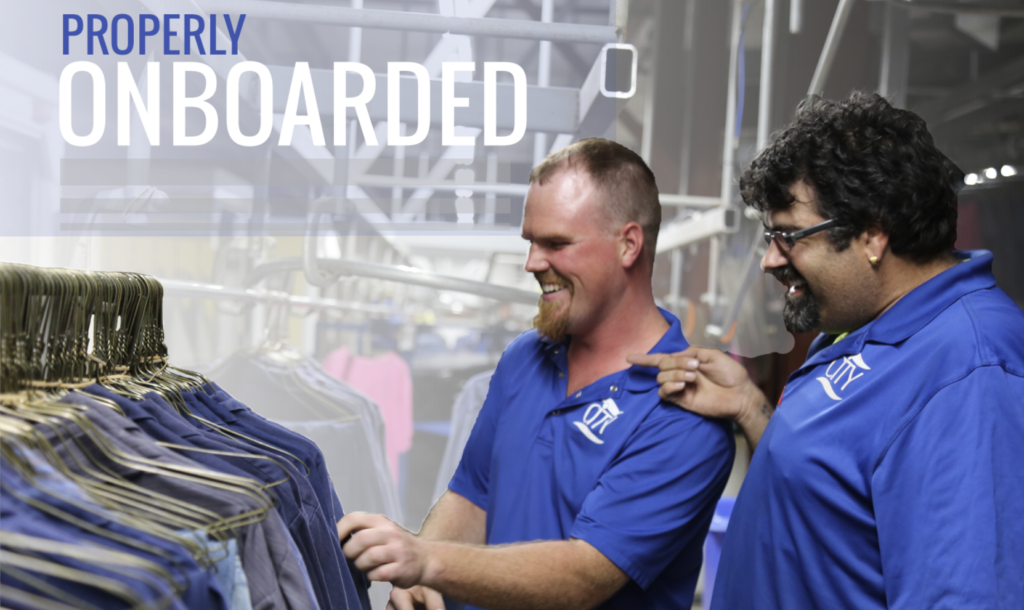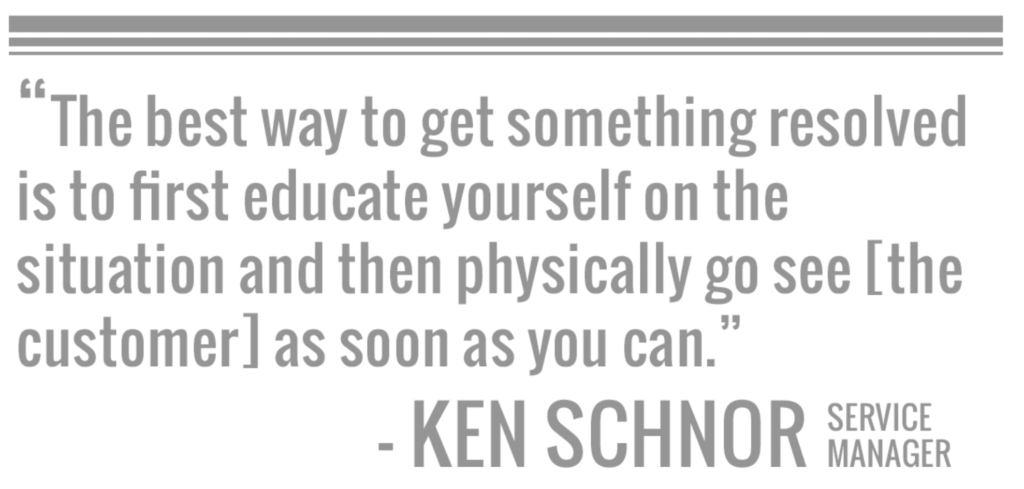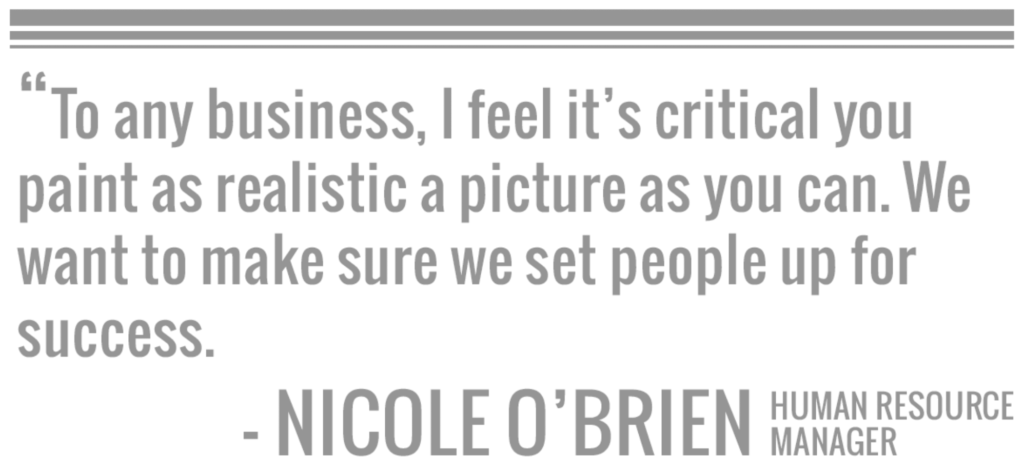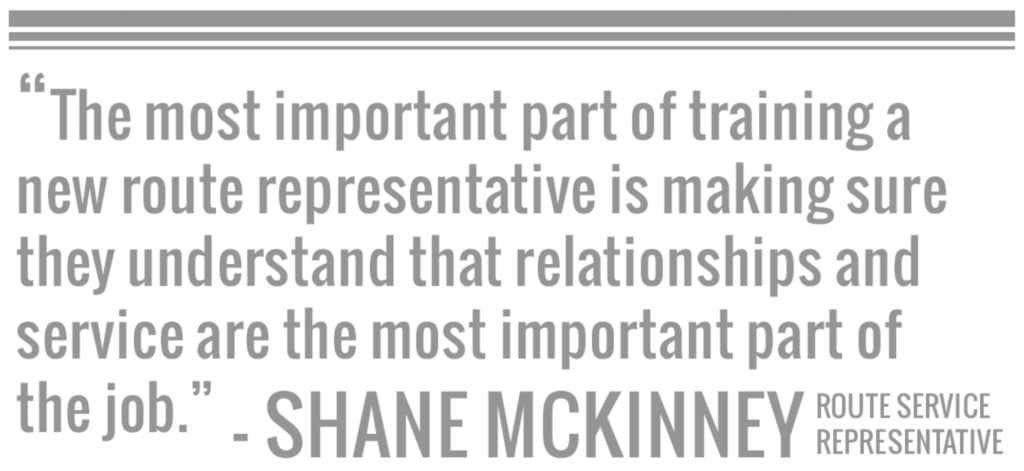Successful Onboarding | Spirit of Service
ONBOARDING: THE BACKBONE OF BUSINESS
Properly training an employee and providing them with the tools they need to succeed is essential to any business model. In the service industry, part of CITY’s success is a result of the professional skills we teach our employees, but we also instill values of customer satisfaction and service in our employees. This concept and practices are vital when it comes to onboarding route service representatives and route apprentices, as they are a direct representation of these values to our clients.
THE IMPORTANCE OF ONBOARDING
Naturally, most business personnel would say employee onboarding and training are essential. However, many companies still struggle with high employee turnover and employee dissatisfaction due to the training they’ve received.

Taking the Time
Sometimes the employee onboarding process is rushed. It does take time and effort to ensure new employees are comfortable and properly trained. Businesses with a standardized employee onboarding and training process actually have 54 percent greater productivity among new hires than a business without a standardized onboarding process, according to UrbanBound.
Also, UrbanBound states that it takes 34 percent less time for an employee to become fully proficient at a business that utilizes a standard onboarding process than that of a business without a standard process. The total time saved equates to about four months, which can be crucial in avoiding high turnover rates.
The Cost of Turnover
With any company, turnover is an expected part of the business. High turnover rates make it difficult to manage a productive business.
Often, businesses underestimate the number of contributing factors to the overall cost of replacing employees. There are many upfront costs as well, such as the time and money it takes to advertise, recruit, and interview for a position.
The actual cost of replacing an employee varies from industry to industry and business to business, but according to a study conducted by the Society for Human Resources Management (SHRM), the average cost-per-hire is $4,129 with an average of 42 days to fill the position.
Proper onboarding and thorough training are very real, feasible solutions to help fight employee turnover and save time and money in the long run.
Finding the Right Fit
Finding the right fit is an essential aspect of the onboarding process, as it lays the groundwork for a business-employee relationship. From the hiring process and on, it is important that an employee not only feels comfortable with the position but also that the employee truly has a passion for what they are doing and have the ambition to perform their work to the best of their ability.
Understand their level of commitment.
Finding someone who has a true commitment in his or her career is someone you want on your team. Employees who often change careers just for higher salaries are not the right person for the job according to Forbes.
Learn their talents, skills, and abilities.
It’s important to know where a potential employee’s strengths lie and where they could use improvement and guidance. The interview process, as well as the onboarding process, are excellent ways to learn about the candidate. Tools such as the DiSC model, a personality and behavior assessment that helps thousands of organizations worldwide can help employers understand the candidate’s personality.
Discover their values.
The best candidates will have values that match your own company’s values. For example, a candidate interviewing for a service based business that mentions a commitment to the customer as well as the importance of responsiveness will fit in well and will further drive the company’s culture.
CITY’S VALUES
At the core, our goal is to help other people, and as a service based business, we value urgency, responsiveness, and commitment to our customers. Finding people who align with our business values is something we strive for at CITY. To meet these standards, our route service representatives need to have the desire to do more than simply deliver products. At CITY, we have route service representatives, rather than route drivers. We do our best to display that our team is more than just drivers. They are route service representatives because they are providing a service that helps our clients operate their business at a higher level. This mindset is at the core of our service team, and it all starts on the first day of their employment at CITY.
Client Satisfaction
We are here to serve our clients with professional account management; therefore, our route reps need to have the desire to satisfy their clients to the best of their ability. We do this by building a service-minded team from the very beginning.
Responsiveness
Communication is essential to every business. We instill confidence in our clients by always being accessible, even at the executive level. We remain connected with our customers and respond to needs quickly and effectively because we believe this kind of commitment builds strong client relationships.
Additionally, CITY’s route service representatives are unique because they have the authority to make decisions and propose solutions without asking a manager so clients can get back to running their business instead of worrying about ours. This means finding candidates that have good communication and listening skills, but also the ability to problem-solve and think critically.
Urgency
A sense of urgency, or hustle, is one of the most valued qualities an individual can have at CITY. We communicate and seek to find solutions to problems within 24 hours.
“Responsive communication is the key,” Service Manager Ken Schnor said. “The best way to get something resolved is first to educate yourself on the situation and then physically go see [the customer] as soon as you can.”

Quality
Our CITY Quality Management (CQM) system is a testament to our desire for providing a high-quality service for our clients. Every department in our workflow plays a role in the quality process. Every individual who is hired shares a mindset that supports our process.
The culmination of these characteristics and practices is quality service. From the responsiveness of our route representatives to our ability to provide client satisfaction in everything we do, we work hard to go above-and-beyond.
Therefore, it takes ambition to work at CITY, but only because we are ambitious ourselves; we want to forever service our clients with the personal, responsive service for which we are known.
“After receiving such poor service from our past uniform companies, we didn’t think that we had any options and just thought that this was the “normal” of today. After much research was done, we were able to find CITY. We couldn’t be happier as we are always given absolutely the best service anywhere! A big thank you to Mark Ballo (Regional Manager), Shane McKinney (Route Service Representative), and the entire CITY for making us family, not just another stop.” Scott’s Automotive | Des Moines Iowa.
ONBOARDING BEFORE THE HIRE
Before hiring an employee, it is important to be upfront and provide an accurate description and representation of what a job will be like to encourage the employee’s engagement, overall success, and retention.
Employee Engagement
Employee engagement is vital for a business’s success. It is necessary that a new employee understands job expectations from the very beginning of their employment. An employee that understands how they impact the company’s goals encourages them to work towards those goals. When the company’s goals resonate with an employee, that individual will feel much more of an emotional commitment as well.
Overall Success
Understanding job expectations directly influence an employee’s success. Employees who are frustrated or confused due to a lack of understanding of job requirements will be unsuccessful in their position, which leads to poor productivity.
Employee Retention
Over 50 percent of employees are looking for a job elsewhere. Because of the harsh reality of this statistic, it is more vital than ever that a business invests in well-structured onboarding and training to make sure employees are confident they are in the right position, and that they have the tools necessary to succeed.
THE CITY HIRING PROCESS
Ensuring that every employee receives consistent, thorough training is part of what makes the onboarding process at CITY unique. If we promise our clients a consistent, quality service every time, we have to follow up by training consistent, quality employees and instill those values of the company into their character.
Interviews
At CITY, the hiring process for a route apprenticeship includes not one, but two interviews. The first interview is a preliminary phone screening done by Human Resources Manager Nicole O’Brien.
Following the phone screen, the candidate is asked to come in for an in-person interview with O’Brien and Schnor. In this interview, our management re-examines the values and personality characteristics that match CITY’s culture. Also, our management evaluates the skills that will be necessary for the job: communication, time management, and hustle.
“To any business, I feel it’s critical you paint as realistic a picture as you can,” said O’Brien. “We want to make sure we set people up for success. To do that, we communicate the information they need and provide the resources they need. Even with job postings, we might say ‘here’s a day in the life of a sales representative’ before an interview.”
Check out CITY’s Join Our Team Page.
Ride-Along
If the interview goes well and management feels the candidate is a good fit for CITY, they are asked to go on a ride-along to make sure the position at CITY is a good fit for them as well. During the ride-along, the candidate is paired with a veteran route service representative for the day, and they can see exactly what the job entails.
“I think the ride-along is very important so that potential hires know what they’re getting into but also so that new employees can get a feel for the standard of work they need to be at,” said Alex Wedgeworth, a CITY route service representative.
This process is also helpful for CITY’s management because it provides insight into the candidate’s ability to meet the demands of the job position.
“We’ve found that our success rates are much higher with the hiring process if we do ride-alongs,” said Schnor.
ONBOARDING AFTER THE HIRE
In business, training is important because it ensures an employee is productive and the investment made by the company is worthwhile. However, there are benefits for the employee as well if proper training occurs.
As stated by JobScience, successful orientation increases the satisfaction of employees because they are more comfortable in the workplace and they have likely gained new skills. Furthermore, the Society for Human Resources Management (SHRM) found that only 25 percent of employees were satisfied with their job-specific training, and over 40 percent felt that poor training was detrimental to their overall job satisfaction.
After the Hiring Process at CITY
In particular with the route apprentice position, onboarding before officially hiring as well as continuing the onboarding process afterward is key, because the position itself is one long training process. The reason for this extensive preparation is to provide CITY’s clients with a guaranteed productive and responsive relationship with their route service representative.
“CITY’s onboarding process is an ongoing process, it could be as long as a year before an employee has learned a job thoroughly,” said O’Brien. “CITY’s onboarding process is unique in that we take more time with it. CITY strives to be more thorough. Even if an employee decides CITY isn’t where they want to be permanently, we still view the experience as a success because they had a positive experience here and went on to have success elsewhere; they then go on to tell others about the positive experiences they had here.”
Shadowing a Mentor
Once hired, route apprentices work alongside management and current route service representatives to gain experience with a variety of our clients. The apprentice is initially paired with one route service representative, and they assist the route rep with servicing our clients on an assigned route.
Apprentices often get the chance to shadow several route service reps on multiple routes to gain exposure to the different industries CITY services. The needs of the food processing industry compared to the needs of the manufacturing industry or automotive industry are drastically different, and our goal is to provide for every client as a total-solutions provider.
For example, Shane McKinney, a CITY route service rep at our Polk City location, has overseen training for many new route reps.
“I do think it’s beneficial to see how people do multiple routes so you can see how people do things differently and decide for yourself the best way to run your route,” McKinney said. “The most important part of training a new route representative is making sure they understand that relationships and service are the most important part of the job. Even if it’s just someone you see in a client’s warehouse, if you see them every day, you should know their name and be greeting them.”

Shane also went through the onboarding experience himself by shadowing route service representatives, as well as Mark Ballo, CITY’s Des Moines regional manager.
“My first mentor was actually Mark Ballo,” said McKinney. “He was very thorough; he talked me through invoices and those kinds of processes in addition to teaching me CITY’s values for quality service and transparency with the clients.”
Apprenticeship and Growth
As an apprentice, the goal of onboarding is to provide a seamless, efficient process through which new route service representatives can continue our tradition of providing quality service to every one of our clients, every time.
Ideally, a route service apprentice will shadow the same route service representative for a large portion of their training, but sometimes the demands of business dictate that apprentices need to work in other routes as well. However, this results in great growth among our employees overall, as that diversity of experience better prepares our route service representatives to respond positively to situations where they need to problem solve or adapt to a new client’s needs.
“At the end of the day, we’re looking for a committed route service representative,” said Schnor. “Doing the work is important, but that’s physical. The most important part of the job [as an apprentice or a route representative] is interacting with the client and representing not only yourself but CITY in the best way possible.”
Around the third week of the apprenticeship, the apprentice will take the lead on the route for the day, and the route representative will act as if he or she is the one being trained. In the fourth week, the route apprentice will still lead the route, but they will work the route by themselves for a day to see how they are developing a route apprentice.
“After about four weeks, the apprentices jump in with other route service representatives, and this works well because they can pick up on the different things each route rep does—good or bad— and find the best way they can fulfill goal number one: servicing our clients,” said Schnor.
VALUING SERVICE
Prior to hiring, management’s role is to find candidates whose values and ambitions match CITY’s, and then put them in a position that fulfills their potential and allows for success. Our number one priority is the satisfaction of our clients through our service, and that starts with putting the right people in roles that match their skill set and their character. The human resources department handles the character and values of a candidate, and our service department develops the skills necessary for the job.
During training, the primary goal and focus of onboarding are to develop a service-mindset in our route service apprentices. Through the onboarding process, particularly when completing ride-alongs and shadowing our route service representatives, CITY understands the importance of teaching new apprentices about our values of quality service.
This committed onboarding process is significant not just to route apprentices, but to every new hire at CITY. Through 112 years, our clients have come to value the consistency of positive interactions with every contact, and we are determined to continue this practice for the next 100 years.
Comments
Comments are closed.